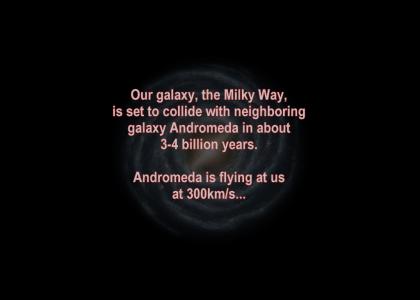Our galaxy is doomed
Created on: August 24th, 2006

Sync works great in firefox. For perfect sync, you may need to press enter/click the go button (refresh works too, but less good.) Works pretty good in IE too. Sorry folks, it's been said before.. you can't sync a YTMND perfectly for everyone.
Sponsorships:
| user | amount | user | amount |
|---|---|---|---|
| No one has sponsored this site ( ._.) | |||
| Sponsor this site! | Total: $0.00 | Active: $0.00 | |
Vote metrics:
| rating | total votes | favorites | comments |
|---|---|---|---|
| (4.35) | 1,251 | 133 | 439 |
View metrics:
| today | yesterday | this week | this month | all time |
|---|---|---|---|---|
| 1 | 1 | 0 | 0 | 38,822 |
Inbound links:
| views | url |
|---|---|
| 56 | https://www.bing.com |
| 6 | http://www.google.com.hk |
| 6 | https://www.reddit.com/r/educationalgifs/comments/62zrff/in_4_bi |
| 4 | https://www.google.com/ |
| 3 | https://yandex.ru/ |
if we can apply an inverse anti-graviton beam to the galactic core or the andromeda galaxy, it should cause the entire thing to disintigrate. However the only way to create enough anti-gravitons is to simotaniously fire a tachyon burst in the around the anti-graviton beam, so as to create a tachyon flux that would allow the gravitons being emitted by the Andromeda galactic core to be rerouted into anti-gravitons moving toward the center of Andromeda.
dude! u guys! ill still 5 it but this is all wrong- the stars and planets are so spread out in each galaxy, that there is almost a non-existant chance that even two stars would collide. its like think of a very very wide mesh door or something, and throwing sand through it. if the holes in the mesh are big enough, most of the sand wont even touch it!
Also, galaxies collide with each other quite often, but we dont see them cause they are so far away. We see the results of them but its not really anything disasterous, the planets and stars are so spread out that almost nothing happens if you were on a planet in one of those galaxies. What you would see is something like the milky way as close and as bright as the moon.
About two million light years (20 billion billion kilometers) away lies the Andromeda Galaxy, a spiral galaxy similar in size and shape to our Milky Way. Current measurements suggest that, in about three billion years, the Milky Way and Andromeda galaxies may collide. What will happen? The stars in the galaxies, our Sun included, will probably not hit each other, but the galaxies' mutual gravity will probably pull, twist, and distort them until, about a billion years later, a new elliptical-shaped galaxy is
Aorry, you fail to realize that the space between stars in a galaxy is vast. Andromeda and the Milky Way are liable to pass through eachother harmlessly. It might even cause both galaxies to merge into a larger galaxy. This isn't a disaster. Unless you're that stellar 5% that either gets slingshotted out of the galaxy into the black, or actually collide with a star. This isn't as big of a deal than it sounds.
Good Work, as galaxy collisions are a very interesting topic in current research! I made a simulation of this event for my Carnegie Mellon Extragalactic Astrophysics class using roughly 2:1 ratio DM Halo particles to luminous matter particles by way of Fortran gravity treecode from Princeton. View @ http://soundutensils.ytmnd.com/ and let me know what you think!
Lol... funny... but collisions of galaxies is not a catostrophic event... as a matter of fact no stars will probably colide even when the galaxies "colide" because the stars are lightyears away from each other. The only thing it could maybe do is throw a planet or 2 out of orbit and make all the stars change positions instead of a neat little spin. The chances of a collision with our planet in a galaxy collision is (laugh) astronomical.
http://www.astronomynotes.com/galaxy/s10.htm
Check it yourself
Christ... What about our grandchildren's grandchildren's grandchildren's grandchildren's grandchildren's grandchildren's grandchildren's grandchildren's grandchildren's grandchildren's grandchildren's grandchildren's grandchildren's grandchildren's grandchildren's grandchildren's grandchildren's grandchildren's grandchildren's grandchildren's grandchildren's grandchildren's great-great-great-great-great-great-grandchildren!
Bold
Italic
Underline
Code
User Link
Site Link